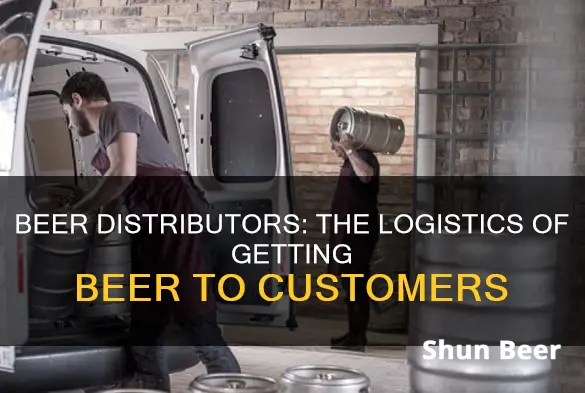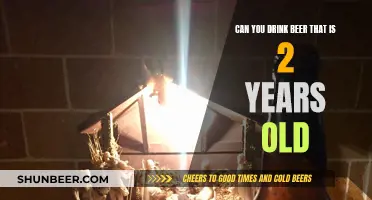
Beer distributors are an essential part of the alcohol industry, connecting breweries with retailers and consumers. Distributors, also known as wholesalers, are independent businesses licensed by federal and state governments to transport and sell beer. They form the middle tier of the three-tier distribution system, which includes producers, distributors, and retailers. Distributors buy beer from breweries and sell it to retailers, who then sell it to consumers. This system prevents tied-houses and ensures a variety of beers are available to consumers. Distributors also play a role in tax collection, paying state and local taxes on behalf of the brands they represent. While some breweries self-distribute, especially in the local market, most rely on distributors to reach a wider audience. Distributors can vary in size, with larger ones offering lower shipping costs and more representatives, while smaller ones may have connections to niche stores. Distributors are crucial in helping breweries expand their reach and get their products into the hands of consumers.
What You'll Learn
- Distributors are licensed to get beer to retailers
- Distributors are also small business owners, civic leaders, and philanthropists
- Distributors are an extension of the sales arm of beverage brands
- Distributors are responsible for introducing products to retailers
- Distributors are a vital part of the state-based system of alcohol regulation

Distributors are licensed to get beer to retailers
Beer distributors are licensed to get beer to retailers. They act as the middleman between brewers and the liquor and grocery stores that sell the final product. Distributors are independent businesses that service every state and congressional district across the United States. They are licensed by both the federal and state governments and are required to have permits from both levels to operate legally. Distributors are responsible for getting bottles, cans, cases, and kegs from brewers or importers to retailers, such as local restaurants, bars, and stores.
The process of becoming a licensed beer distributor involves several steps. Firstly, distributors need to obtain an Employee Identification Number (EIN) from the IRS by completing IRS Form SS-4. This is followed by filling out permits with the United States Alcohol and Tobacco Tax and Trade Bureau (TTB), which oversees a thorough application process to ensure compliance with legal requirements. Distributors must complete the Application for Basic Permit under the Federal Alcohol Administration Act, providing their business name, EIN, personal contact information, and recent residences.
In addition to federal permits, beer distributors also need to obtain state permits. They should contact their state's Attorney General's Office or Secretary of State's Office to determine the necessary permits and licensing requirements. Distributors must also consider zoning regulations and comply with any special proximity laws regarding the location of their distribution business in relation to places like churches and schools.
Once licensed, beer distributors work with brewers to facilitate the delivery and warehousing of their products to retailers. Distributors play a crucial role in helping new brands reach the market and ensuring a diverse selection of beer for consumers. They are an integral part of the three-tier system in the beer industry, acting as the middle tier between brewers and retailers. Distributors also contribute to the local economy and community engagement through job creation and participation in programs that promote responsible consumption and combat drunk driving and underage drinking.
Snail Solution: Beer Trap's Effectiveness and Efficiency
You may want to see also

Distributors are also small business owners, civic leaders, and philanthropists
Beer distributors are licensed by both the federal and state governments. They get bottles, cans, cases and kegs from a brewer or importer to the shelf of your favourite store, local restaurant or neighbourhood bar through a safe, transparent and accountable system. Distributors are a critical link in a three-tier distribution system, which includes brewers and importers, distributors and retailers. Distributors are an important component in the operation and success of a craft brewery. They help new brands get to market and ensure that consumers can choose from a vast selection of beer.
Beer distributors are also small business owners, civic leaders, and philanthropists. They are active in their communities, playing a vital role in keeping the communities where they live and work safe. Distributors sponsor a wide array of programs to promote responsible consumption, combat drunk driving and reduce or eliminate underage drinking. They also value their role in the state-based system of alcohol regulation that works to keep communities and citizens safe while encouraging healthy competition and a robust marketplace.
America’s more than 3,000 independent beer distribution facilities are local businesses that operate in every state and congressional district across the United States. They provide over 135,000 solid jobs with good benefits to people who live in their communities. Distributors do more than buy, store, sell and deliver beer. From truck drivers to forklift operators and from sales representatives to graphic artists, distributors work hard every day to provide the greatest choice, best variety, and selection of beer anywhere in the nation. Distributors also assist retailers through point-of-sale advertising, merchandising and stocking.
Centrifugal Force: Spinning Beer to Perfection
You may want to see also

Distributors are an extension of the sales arm of beverage brands
Distributors are an essential component in the operation and success of a beverage brand, acting as an extension of the sales arm of the brand. They are responsible for getting the products from the brewer or importer to the shelves of stores, restaurants, and bars through a safe and transparent system. This process is often referred to as the three-tier system, with the brewery, distributor, and retailer forming the three tiers. Distributors help new brands enter the market and ensure a wide selection of beverages for consumers.
In the United States, independent beer distributors are licensed by both federal and state governments and play a vital role in their communities. They are small business owners, civic leaders, and philanthropists who actively contribute to their local communities. Distributors also work to promote responsible consumption, combat drunk driving, and reduce underage drinking. They value their role in the state-based system of alcohol regulation, which ensures community safety while encouraging competition and a robust marketplace.
The role of distributors goes beyond logistics and storage. Distributors act as brand stewards and tax collectors for the supplier side, paying state and local taxes on behalf of the brands they represent. This frees up suppliers from navigating complex tax codes in each state and locality. Large distributors may also provide comprehensive support to their supplier partners, including consulting on sales, marketing, and strategic planning. Distributors have a vested interest in the success of the brands they carry and play a crucial role in brand-building.
When selecting a distributor, beverage brands should consider their relevance in the market and their alignment with the brand's vision and route-to-market strategy. Distributors vary in size and scope, from major brand houses that work with the biggest alcohol companies to specialty distributors that focus on handcrafted or imported beverages. It is essential to find a distributor that understands the brand and its unique selling points, fostering a strong partnership based on mutual benefit.
How Well Do Beer Thermoses Work?
You may want to see also

Distributors are responsible for introducing products to retailers
Beer distributors, also called wholesalers, are licensed by both the federal and state governments. They are responsible for buying beer from producers and selling/transporting it to retailers. Distributors work to help new brands get to market and ensure that consumers can choose from a wide range of beers.
In the US, beer distribution is typically carried out through a three-tiered system, with producers (breweries), distributors, and buyers. Distributors are the middlemen that move beer from breweries to bars, restaurants, and stores. This system prevents breweries from directly selling their beer to anyone but intermediaries.
Distributors play a crucial role in helping craft brewers understand the second tier of the business, which is distribution. While some brewers may choose to self-distribute within a limited local market area, most will need to select and secure distributors to reach a wider market. Distributors have established relationships with retailers and can help craft brewers gain recognition and retail placements.
When choosing a distributor, craft brewers should consider factors such as the distributor's knowledge of craft beers, their success with specialty brands, their ability to provide refrigeration and draft support, and their financial stability. Distributors typically work on a 25-28% gross margin for craft beers, and it is essential to establish a comfortable and mutually beneficial relationship between the brewer and the distributor.
Once a distributor is selected, the brewer should work closely with the wholesaler's sales staff to ensure they are excited and educated about the brand. This may involve holding a "kick-off" meeting, providing samples, and discussing pricing, shipping, and advertising strategies. Regular communication between the brewer and distributor is essential to ensure the successful placement and promotion of the beer in the market.
Mouthwash and Beer: Effective Mosquito Repellents or Old Wives' Tales?
You may want to see also

Distributors are a vital part of the state-based system of alcohol regulation
Beer distributors are licensed by both the federal and state governments to get bottles, cans, cases, and kegs from a brewer or importer to the shelves of stores, local restaurants, or bars. They are the middle tier of the three-tier system, which includes breweries, distributors, and retailers. Distributors are responsible for getting the beer to the market and ensuring consumers can choose from a wide range of options.
In the United States, there are 3,000 independent beer distribution facilities, which are local businesses servicing every state and congressional district. They provide over 140,000 jobs to people in their communities. Distributors are often small business owners, civic leaders, and philanthropists who are actively involved in their communities.
Beer distributors are an integral part of the state-based system of alcohol regulation. They play a vital role in keeping their communities safe by promoting responsible consumption, combating drunk driving, and reducing underage drinking. Distributors are also responsible for ensuring that alcohol is distributed through a safe, transparent, and accountable system.
State laws often dictate the distribution of alcohol within a state, and these laws vary across the country. Distributors must be aware of and comply with the specific regulations of each state in which they operate. This includes regulations on what a brewer may supply to retailers and distributors, payment terms, and the often restrictive terms for terminating a distributor relationship. Distributors are subject to franchise laws that make it difficult to terminate a brewery/distributor agreement.
The state-based system of alcohol regulation, with distributors as key players, helps maintain orderly markets and collect tax revenues. Distributors are responsible for ensuring that alcohol is distributed safely and responsibly, while also encouraging healthy competition and a robust marketplace.
Do Beer Cozies Work? The Science Behind It
You may want to see also
Frequently asked questions
A beer distributor, also known as a wholesaler, is an independent, licensed business that buys beer from breweries and importers and sells/transports it to retailers.
Distributors act as an extension of the sales arm of the beer brand (the supplier). They introduce and sell products to retailers, and work with the supplier to build a brand that consumers return to. Distributors also act as tax collectors for the supplier, paying state and local taxes on behalf of the brands they represent.
The three-tier distribution system is a framework that includes breweries, importers, or anyone who manufactures or supplies beer in cans, bottles, or kegs (tier 1); distributors or wholesalers (tier 2); and retailers, including bars, restaurants, and stores (tier 3). This system prevents single ownership of all three tiers and bars producers from selling directly to retailers.
When choosing a beer distributor, consider their relevance in your market and their route-to-market strategy. Ask your desired retailers which distributors they enjoy working with and why. Also, consider the competitive products a distributor carries and how often your product might be set aside in favor of competing products.







